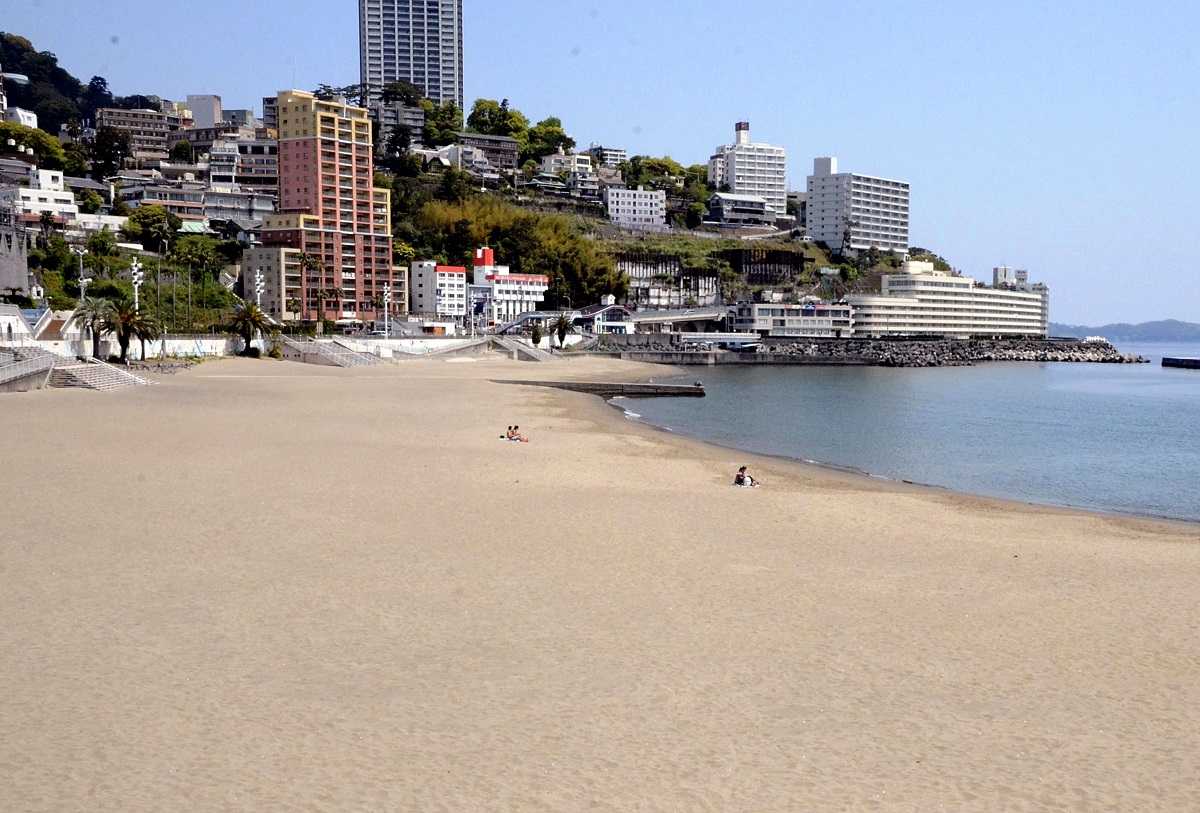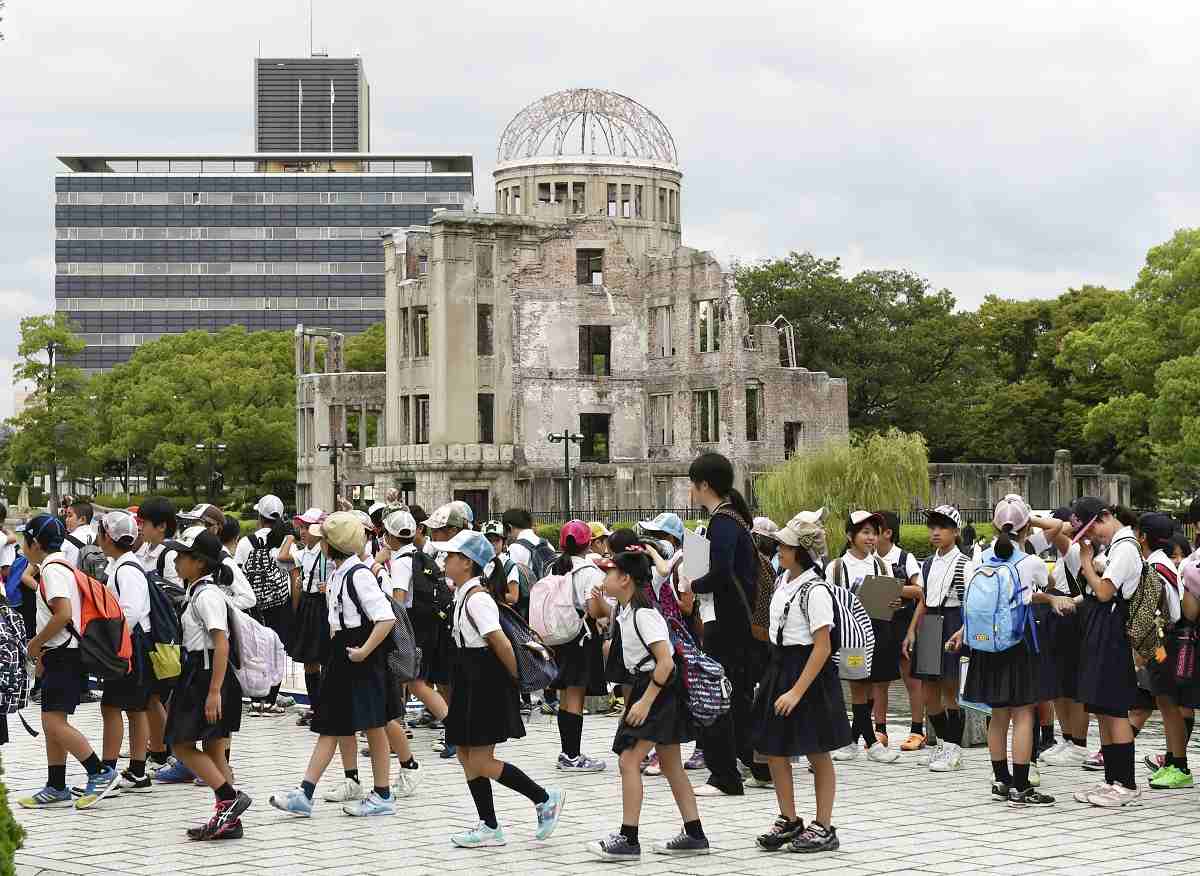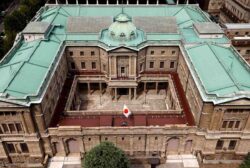
Atami, a popular seaside destination for group travel in Shizuoka Prefecture, saw tourism dry up when a state of emergency was declared in April last year.
18:49 JST, February 21, 2021
Group travel, with participants gathering for photos at scenic or historic spots in the daytime before dining together at night, has appealed to Japanese for many years. However, this type of travel is now in trouble due to the pandemic. Demand has sharply dropped over fears of crowded situations in which infections could spread. Amid this, some businesses have begun searching for and trying out new styles of travel.
‘Demand has dried up’
“Plans for about 2,300 reservations have disappeared,” said an employee of Tokyo-based Nippon Travel Agency Co., speaking in December at a branch in the Tokyo metropolitan area.
Most of the 2,300 reservations, which the branch had arranged mainly for groups, were cancelled after a scheduled book-related event was changed to being held online.
“Demand has dried up,” the employee said. “We hadn’t anticipated this. I don’t know when it will recover.”
Last year, Nippon Travel Agency’s interim results from January to June showed a 70.1% drop in the transaction values of domestic group travel compared with the same period in the previous year, with a 67.5% drop in November.
JTB Corp., another major travel agency, saw a 91% drop from April to September.
In recent years, some studies have shown that group sightseeing in Japan has declined to account for less than 10% of the travel market. However, the importance of group tours has not dimmed because sales per group are big.
“Hotels and tourist spots are eager to receive tourist groups,” said a Nippon Travel Agency employee in charge. “We want to get through this situation however we can.”

The area around the Atomic Bomb Dome in Naka Ward, Hiroshima, usually attracts many students on school trips, as shown in this photo taken on Sept. 17, 2015.
Companies, schools a driving force
In Japan, group travel had been the driving force of the travel industry for many years.
The forerunner was pilgrimage trips organized by Japan’s first travel agency, Nihon Ryoko-kai (now Nippon Travel Agency), founded by Shinsuke Minami in 1905. Based on his experience of selling bento meals at Kusatsu Station in Shiga Prefecture and being involved in operating a dining car, he planned a trip to visit the sacred Koyasan area and Ise Grand Shrines by train. About 100 people participated in each of the first trips. He also began services such as providing booklets of travel information and famous local sweets. Similar services are still in practice in the travel industry.
Group travel gradually spread to the general public. During the rapid economic growth after the end of World War II, group travel became part of the corporate culture in the form of company trips to support the wellbeing of employees and to strengthen unity among workers.
School excursions, which started in the Meiji era (1868-1912), also took root in the post-war period and became a stable source of income for the travel industry. Mainly due to an increase in personal income over the decades, demand for group travel was overtaken by demand for individual travel.
“The appeal of group travel has never faded,” said Prof. Masami Morishita of Toyo University’s Faculty of International Tourism Management, a specialist in tourism marketing. “Participants still have a good time together and deepen their camaraderie. There is a great potential need for this type of travel as people are reevaluating their relationships with others amid the coronavirus pandemic.”
New approaches
The travel industry is trying to find ways out of its economic woes by making better use of information and communication technology and placing emphasis on a category of business travel known as MICE — an acronym for meetings, incentives, conferences and exhibitions. (“Incentives” include events such as training programs.)
A record 527 international conferences were held in 2019 in Japan, with spending by foreign visitors at those and other events reaching ¥211.7 billion in 2018, according to the Japan Tourism Agency. These figures suggest that growth related to MICE can also be expected in the post-pandemic world.
The Tokyo metropolitan government, which is working to attract MICE events, has drawn up operational guidelines in view of infection control measures, under assumption the pandemic will last long, including the use of online chats for question-and-answer sessions at event venues and digitizing explanatory materials.
A metropolitan government official in charge said the government “will seek ways to hold [such events] that meet the new environment.”
Some company travel plans are drawing attention with their approach of “team building,” in which employees are given a problem they need to work together to solve.
Package plans offered by Prince Hotels Inc. include ones in Karuizawa, Nagano Prefecture, that feature orienteering and curling on a rink. The hotel says it receives “requests for strengthening ties among employees, which may be a reaction to the pandemic. We will continue to view this as a primary source of revenue in the future.”
Online group tours organized by Tokyo-based travel agency Autabi are also enjoying popularity. Some local governments and other entities are cooperating in organizing these tours, while hoping their efforts will attract in-person group travel after the pandemic.
Top Articles in Business
-

Prudential Life Insurance Plans to Fully Compensate for Damages Caused by Fraudulent Actions Without Waiting for Third-Party Committee Review
-

Narita Airport, Startup in Japan Demonstrate Machine to Compress Clothes for Tourists to Prevent People from Abandoning Suitcases
-

Japan, U.S. Name 3 Inaugural Investment Projects; Reached Agreement After Considerable Difficulty
-

JR Tokai, Shizuoka Pref. Agree on Water Resources for Maglev Train Construction
-

Toyota Motor Group Firm to Sell Clean Energy Greenhouses for Strawberries
JN ACCESS RANKING
-

Japan PM Takaichi’s Cabinet Resigns en Masse
-

Japan Institute to Use Domestic Commercial Optical Lattice Clock to Set Japan Standard Time
-

Israeli Ambassador to Japan Speaks about Japan’s Role in the Reconstruction of Gaza
-

Man Infected with Measles Reportedly Dined at Restaurant in Tokyo Station
-

Videos Plagiarized, Reposted with False Subtitles Claiming ‘Ryukyu Belongs to China’; Anti-China False Information Also Posted in Japan





















